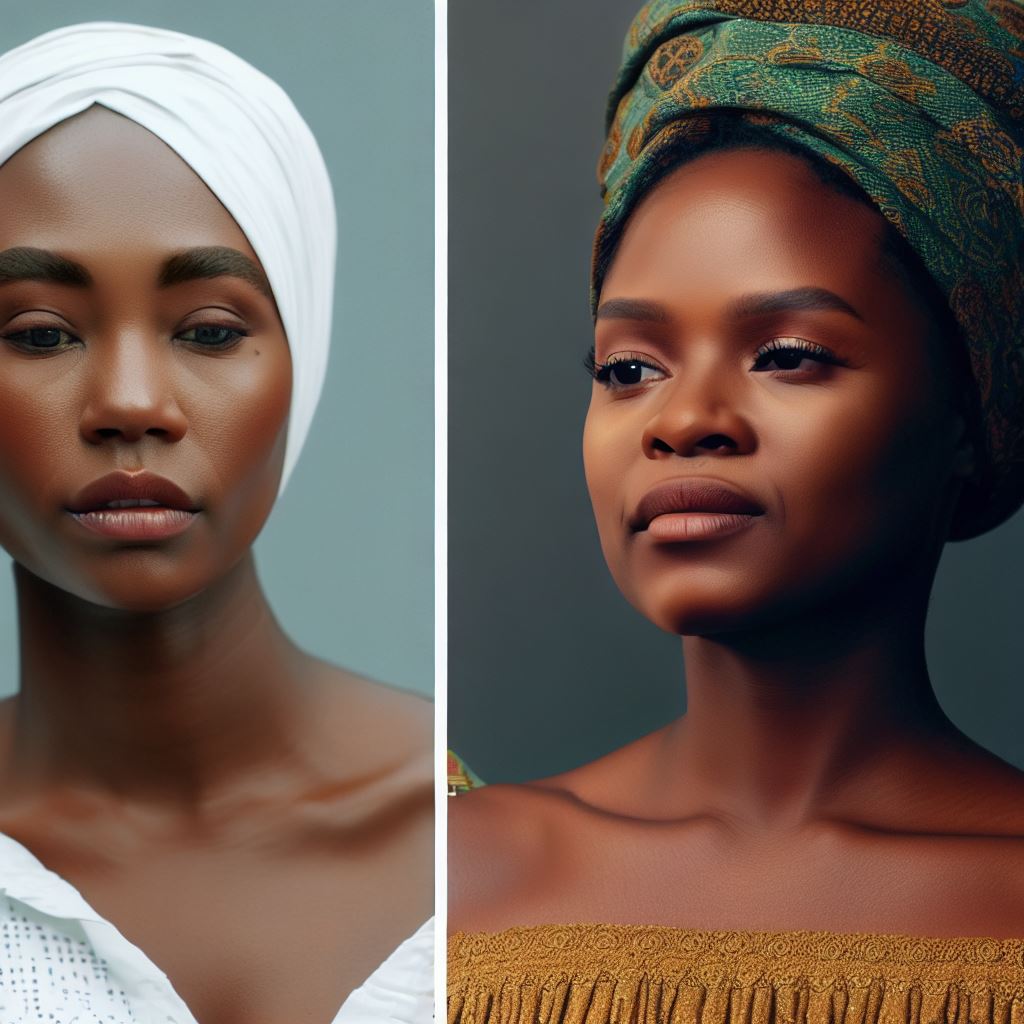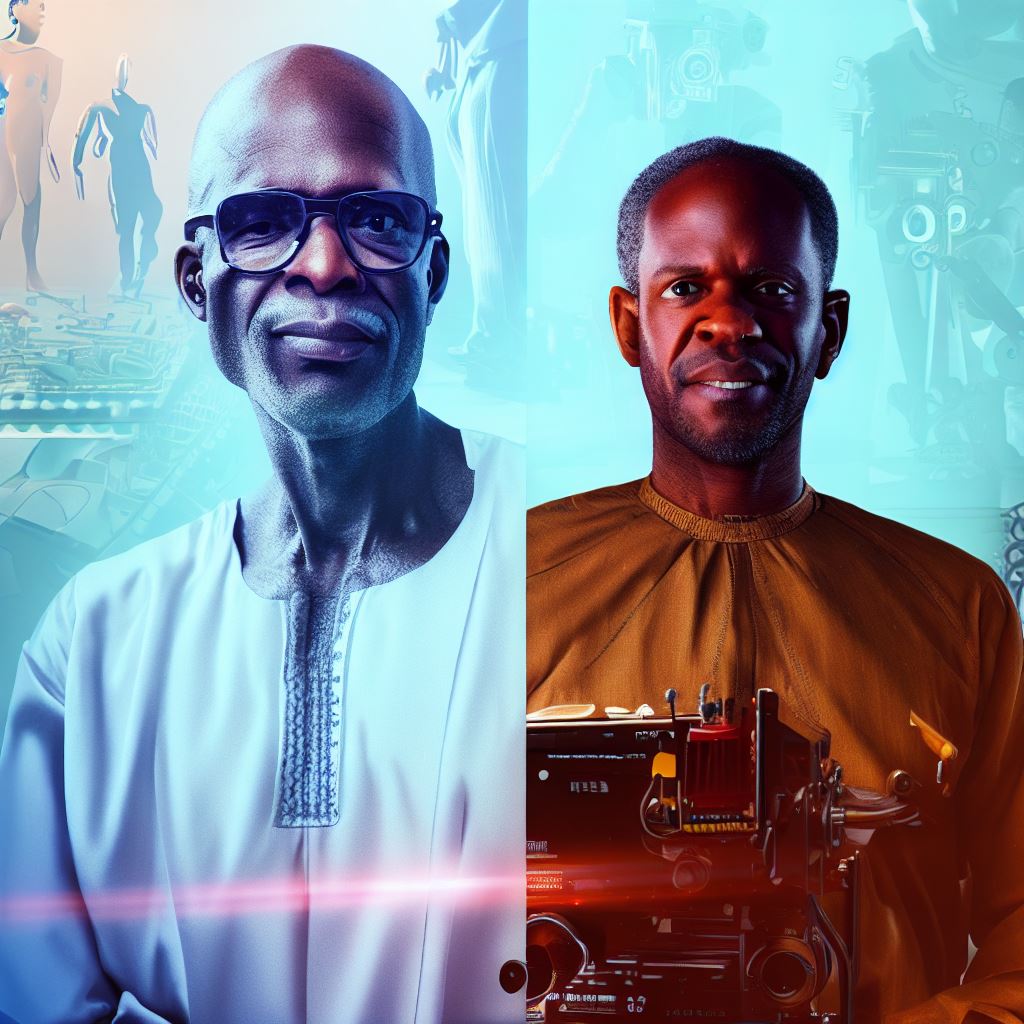Introduction
Let’s explore diversity in Nigerian film composing: A closer look.
Nigeria’s film industry, also known as Nollywood, is one of the largest and most influential in Africa. Film composing plays a vital role in shaping the Nigerian cinema, adding depth and emotion to storytelling.
This blog post delves into the diversity in Nigerian film composing and how it impacts the industry.
Nollywood has gained international recognition for its prolific production of films that explore various themes.
Composing music for these films is essential as it enhances the narrative and evokes emotions in the audience.
From sorrowful melodies to upbeat tunes, the music complements the storytelling and brings the scenes to life.
The diversity in Nigerian film composing showcases the rich cultural heritage of the country.
Traditional Nigerian instruments like the talking drum, shekere, and kalimba are often incorporated into the film scores, giving them a distinct and authentic African sound.
This encourages cultural preservation and promotes Nigerian identity on a global scale.
Additionally, Nigerian film composers draw inspiration from different genres and styles, creating a fusion of traditional and contemporary music.
This unique blend adds an element of surprise and originality to the films, making them stand out in the global film industry.
Moreover, the diversity in film composing offers opportunities for collaboration between Nigerian composers and international artists.
This exchange of ideas and musical influences enriches the industry and promotes a global understanding of Nigerian culture.
In short, the diversity in Nigerian film composing is a significant aspect of the industry that adds depth and authenticity to the storytelling.
It showcases the rich cultural heritage of the country and promotes Nigerian identity on a global scale. Moreover, it encourages collaborations and fosters global understanding.
Overview of Nigerian film industry
The Nigerian film industry, popularly known as Nollywood, has experienced significant growth and holds great significance in Africa’s entertainment landscape.
With its evolution over the years, Nigerian cinema has gained international recognition and exerted influence on other film industries worldwide.
1. Growth and significance of Nollywood
Nollywood emerged in the 1990s and quickly became the second-largest film industry globally in terms of annual film production, right after India’s Bollywood.
This growth can be attributed to the low production cost, high accessibility, and popularity among Nigerian audiences.
Nollywood has generated thousands of direct and indirect employment opportunities and contributed significantly to the Nigerian economy.
2. Evolution of Nigerian cinema
Initially, Nollywood films focused primarily on themes related to traditional Nigerian culture and societal issues.
However, as the industry progressed, it diversified its genres and storytelling techniques.
Modern Nigerian filmmakers now produce a wide range of films, including romantic comedies, action films, and crime thrillers.
This growth reflects the industry’s ability to adapt to changing audience preferences.
3. International recognition and influence
Nigerian films have not only gained popularity within Africa but have also garnered international recognition.
Nigerian filmmakers have won awards and received critical acclaim at major film festivals, such as the Cannes
Film Festival and the Toronto International Film Festival.
This recognition has brought attention to the unique storytelling techniques and cultural richness of Nigerian cinema.
4. Embracing diversity in film composing
As the Nigerian film industry continues to expand, it becomes essential to explore and embrace diversity in film composing.
This includes diversifying the representation of composers from different ethnic backgrounds, genders, and stylistic approaches.
By doing so, Nollywood can enrich its storytelling by incorporating a wider range of musical influences.
5. Strengthening cultural authenticity
Nigerian film composers play a crucial role in ensuring that the music in Nollywood films captures the cultural authenticity and diversity of Nigeria.
By incorporating traditional Nigerian instruments, rhythms, and melodies into film scores, composers can enhance the audience’s immersion in Nigerian storytelling and preserve the country’s cultural heritage.
6. Collaboration and cross-cultural exchanges
One way to promote diversity in Nigerian film composing is by encouraging collaboration and cross-cultural exchanges among composers.
This could involve partnerships between Nigerian composers and international composers, allowing for the fusion of different musical styles and approaches.
Such collaborations can result in unique and innovative musical compositions.
7. Training and mentorship programs
To nurture diversity in film composing, it is important to establish training and mentorship programs that provide aspiring Nigerian composers with the necessary skills and exposure.
These programs can create opportunities for composers to learn from experienced professionals and expand their knowledge of different musical traditions.
8. Recognition and appreciation
Finally, recognizing and appreciating the contributions of Nigerian film composers is vital in promoting diversity.
This recognition can be through award ceremonies, festivals, and platforms that showcase the talents and achievements of Nigerian composers.
By celebrating their work, the industry can inspire and encourage more composers to explore diverse musical styles and approaches.
In essence, the Nigerian film industry has grown tremendously over the years, gaining international recognition and influence.
To continue this trajectory, it is essential to embrace diversity in film composing, strengthen cultural authenticity, foster collaboration, and provide opportunities for training and recognition.
By doing so, Nollywood can further enrich its storytelling and contribute to the global film community.
Read: Historical Evolution of Film Music in Nigeria
Explanation of film composing
Definition and role of a film composer
In the world of filmmaking, the role of a film composer is crucial.
A film composer is responsible for creating the score or soundtrack that enhances the emotions, narrative, and overall experience of a film.
Their composition sets the tone, creates suspense, and engages the audience on a deeper level.
Importance of music in film
Music plays a vital role in films.
It has the power to evoke emotions, convey meaning, and enhance storytelling. It adds depth and richness to the visuals, bringing the story to life.
The right music can create tension, build anticipation, or even make the audience laugh or cry.
It helps to create a captivating and immersive experience, making films more memorable.
Relationship between film composing and storytelling
The relationship between film composing and storytelling is symbiotic. Composing music for a film goes beyond providing background sound.
It supports and enhances the narrative, helping to convey the intended message and evoke the desired emotional response.
It is a collaboration between the composer and the director, as they work together to shape the storytelling through sound.
Diversity in Nigerian film composing
Now let’s dive deeper into the diversity in Nigerian film composing.
1. Variety of Musical Styles
Nigeria is known for its rich cultural diversity, and this is reflected in its film industry.
Nigerian film composers have the opportunity to explore a wide range of musical styles and genres, incorporating traditional African music, Afrobeat, highlife, hip-hop, and more.
This diversity adds depth and authenticity to Nigerian films, making them uniquely Nigerian.
2. Fusion of Traditional and Modern
Nigerian film composers often blend traditional African instruments and rhythms with modern elements to create a unique fusion.
This fusion not only adds a distinct flavor to the films but also showcases the richness and versatility of Nigerian music.
3. Cultural Representation
Nigerian films celebrate the country’s cultural diversity, and the music plays a significant role in representing various ethnic groups and their traditions.
Film composers incorporate music from different Nigerian cultures, giving a voice to the diverse communities and creating a sense of pride and identity.
4. International Collaboration
With Nigerian films gaining global popularity, there has been an increase in international collaboration in film composing.
Nigerian composers have worked with renowned composers from around the world, bringing fresh perspectives and broadening the musical landscape of Nigerian cinema.
5. Emerging Talents
Nigeria has a pool of talented composers who are making a mark in the film industry.
These emerging talents are pushing boundaries, experimenting with new sounds, and creating innovative compositions.
They bring their unique voices to Nigerian films, adding to the diversity and creativity of the industry.
In general, diversity in Nigerian film composing is a vital aspect of the country’s burgeoning film industry.
Through a variety of musical styles, fusion of traditional and modern elements, cultural representation, international collaboration, and emerging talents, Nigerian films are enriched and elevated.
The music in Nigerian films serves as a powerful storytelling tool, connecting with audiences on a deep level and showcasing the richness of Nigerian culture.
Read: The Crossroads of Nigerian Cinema and Music
Historical overview of Nigerian film composing
Nigeria has a rich history of film composing that has evolved over the years. Let’s take a closer look at its development.
Early Nigerian films and their music
In the early years of Nigerian cinema, the focus was on storytelling and entertainment.
Music played a crucial role in enhancing the emotions conveyed in the films.
Composers used traditional Nigerian instruments to create authentic soundtracks.
Incorporation of traditional Nigerian music in films
As Nigerian cinema grew, filmmakers recognized the importance of representing the country’s diverse cultural heritage through music.
Traditional Nigerian music styles such as Juju, Highlife, and Afrobeat were incorporated into film soundtracks, adding a unique flavor to the compositions.
Influence of Western film composing techniques
With the advent of globalization, Nigerian filmmakers began to explore Western film composing techniques.
This was a result of increased exposure to international cinema.
Nigerian composers started incorporating orchestral arrangements, electronic elements, and other modern techniques into their compositions.
Collaboration with international composer
In recent years, Nigerian filmmakers and composers have collaborated with renowned international composers.
This exchange of ideas and expertise has further enriched Nigerian film composing.
It has also helped in creating unique soundtracks that blend traditional Nigerian music with global influences.
Examples of successful Nigerian film soundtracks
1. “The Wedding Party”
This romantic comedy film, directed by Kemi Adetiba, had a captivating soundtrack that perfectly captured the essence of the story.
It featured a blend of traditional Nigerian music and modern pop elements, creating a catchy and memorable soundtrack.
2. “Half of a Yellow Sun”
Based on the novel by Chimamanda Ngozi Adichie, this film showcased the struggles during the Nigerian Civil War.
Publish Your Professional Profile, Business or Brand
Showcase your expertise, gain trust, and boost visibility instantly on Professions.ng.
Publish NowThe soundtrack beautifully complemented the narrative, incorporating traditional Igbo music and emotionally-charged orchestral arrangements.
3. “October 1”
Directed by Kunle Afolayan, this historical thriller highlighted Nigeria’s independence struggle.
The film’s soundtrack combined traditional Yoruba music with contemporary compositions, creating a dynamic and engaging listening experience.
The future of Nigerian film composing
The future of Nigerian film composing looks promising.
As the industry continues to grow, there will be more opportunities for composers to experiment with diverse musical styles and techniques.
With the advancement of technology, composers can now explore innovative ways to create unique soundscapes that enhance storytelling.
Furthermore, the increasing international recognition of Nigerian cinema opens doors for collaborations with talented composers from around the world.
This exchange of ideas will contribute to the evolution of Nigerian film composing and further showcase its artistic prowess on a global stage.
In review, the historical overview of Nigerian film composing demonstrates its evolution from early Nigerian films to the incorporation of traditional music and the influence of Western techniques.
Successful soundtracks from films like “The Wedding Party,” “Half of a Yellow Sun,” and “October 1” highlight the versatility and creativity of Nigerian composers.
The future is bright for Nigerian film composing, with endless possibilities for innovation and collaboration.
Read: Guide to Licensing for Film Composers in Nigeria

Emergence of diversity in Nigerian film composing
In recent years, Nigerian film composing has seen the emergence of diversity in various aspects.
Exploration and incorporation of various music genres
Exploration and incorporation of various music genres have played a significant role in this shift.
Nigerian composers have started to venture beyond traditional African music and embrace different genres.
We now see elements of hip-hop, reggae, jazz, and even classical music being woven into film scores.
This exploration of diverse musical genres adds depth and richness to Nigerian films.
Incorporation of diverse cultural elements in film scores
Furthermore, the incorporation of diverse cultural elements in film scores has become a prominent trend.
Nigerian composers are now embracing their cultural heritage and infusing it into their compositions.
Traditional Nigerian instruments such as the talking drum, shekere, and kalimba are being integrated into film scores.
This infusion of cultural elements not only adds authenticity but also celebrates Nigerian culture on a global stage.
Collaborations between Nigerian and international composers
Collaborations between Nigerian and international composers have also played a significant role in promoting diversity.
Nigerian composers are collaborating with renowned international composers to create unique and innovative film scores.
These collaborations bring together diverse musical perspectives and create a fusion of different styles.
International composers bring their expertise and influence, while Nigerian composers add their distinct flavor.
This cross-cultural collaboration results in film scores that are truly global in nature.
The emergence of diversity in Nigerian film composing has opened up new opportunities and challenges.
Composers are now pushing boundaries, experimenting with different sounds, and breaking traditional norms.
They strive to create music that not only enhances storytelling but also resonates with audiences worldwide.
This shift towards diversity in Nigerian film composing has been positively received by both critics and audiences.
Composers will continue to experiment, collaborate, and push boundaries to create groundbreaking film scores.
As Nigerian films continue to gain global recognition, the music that accompanies them will play an increasingly crucial role.
The emergence of diversity in Nigerian film composing is not just a trend; it is a testament to the country’s artistic growth.
It showcases Nigeria’s ability to blend different cultural and musical influences into a unique and captivating art form.
In brief, the emergence of diversity in Nigerian film composing can be seen through the exploration and incorporation of various music genres, the infusion of diverse cultural elements, and the collaborations between Nigerian and international composers.
This shift towards diversity has opened up new opportunities for Nigerian composers and has elevated the country’s film industry on a global scale.
Nigerian film scores now reflect the country’s vibrant cultural landscape and its ability to create music that resonates with audiences worldwide.
Read: Pioneering Female Film Composers in Nigeria
Impact and implications of diverse film composing
Film composing plays a crucial role in the overall impact and success of a movie. It sets the tone, evokes emotions, and enhances the storytelling experience for the audience.
In the Nigerian film industry, also known as Nollywood, the incorporation of diverse film composing has had a significant impact and implications in several ways.
1. Enriching the film viewing experience
Diverse film composing brings a fresh perspective to Nigerian movies, making them more compelling and immersive.
The infusion of different musical styles, genres, and instruments adds depth and richness to the film’s soundtrack.
It creates a dynamic and engaging atmosphere, capturing the viewers’ attention and enhancing their overall enjoyment.
2. Representation and cultural preservation
By utilizing diverse film composing, Nollywood films can accurately represent the rich cultural diversity of Nigeria.
Different ethnic groups and regions have their unique musical traditions, which can now be showcased through film scores.
This not only highlights the importance of cultural preservation but also promotes inclusivity and representation in the industry.
3. Expansion of international appeal and audience
Diverse film composing in Nollywood movies enables them to resonate with a broader international audience.
Incorporating elements of various musical traditions encourages cultural exchange and appreciation globally.
It helps break down cultural barriers and enables Nigerian movies to reach new markets and gain recognition on a global scale.
The implications of diverse film composing in Nigerian cinema go beyond artistic enhancement.
It has the power to create social change, promote unity, and challenge preconceived notions. Here are a few notable implications:
1. Empowering underrepresented communities
Diverse film composing gives a voice to marginalized communities in Nigeria, celebrating their unique cultural contributions.
This representation fosters a sense of pride and empowerment, both within those communities and for viewers from diverse backgrounds.
2. Sparking dialogue and social awareness
Through diverse film composing, Nollywood movies tackle social issues and spark important conversations.
The combination of powerful visuals and impactful scores can evoke emotions and inspire viewers to take action.
3. Industry growth and recognition
The incorporation of diverse film composing enhances the overall quality and sophistication of Nigerian cinema.
This artistic growth attracts international recognition, awards, and collaborations, further boosting the industry’s growth and prestige.
Basically, the impact and implications of diverse film composing in Nigerian cinema are vast and significant.
It enriches the film viewing experience, preserves cultural heritage, expands international appeal, empowers communities, sparks dialogue, and contributes to the industry’s growth and recognition.
The incorporation of diverse film composing in Nollywood not only showcases Nigeria’s vibrant cultural diversity but also positions the industry as a global force in the world of film.
Find Out More: Insights into Nigeria’s Performer Management Industry
Examples of Nigerian films showcasing diversity in composing
Nigerian film industry, also known as Nollywood, has witnessed a remarkable growth over the years, not only in terms of popularity but also in terms of diversity in film composing.
Several Nigerian films have successfully showcased diversity in composing, employing unique and diverse soundtracks that enhance the cinematic experience for viewers.
Notable films with unique and diverse soundtracks
One of the notable films that exemplify diversity in composing is “The Wedding Party.”
This romantic comedy film, directed by Kemi Adetiba, features an array of songs in different genres, such as Afrobeat, highlife, and contemporary Nigerian music.
The soundtrack perfectly captures the vibrant and celebratory atmosphere of the wedding theme, engaging the audience through its lively and culturally rich melodies.
Another film that highlights diversity in composing is “Half of a Yellow Sun.”
This historical drama, based on Chimamanda Ngozi Adichie’s novel, explores the Biafran war in Nigeria.
The film effectively utilizes a variety of music, ranging from traditional Nigerian tunes to classical compositions, to evoke different emotions and underscore significant moments within the narrative.
These diverse musical choices contribute to the overall authenticity and depth of the film.
Specific film scenes and their musical significance
An analysis of specific film scenes further showcases the musical significance in these films.
For instance, in “The Wedding Party,” the scene where the bride and groom have their first dance is accompanied by a soulful ballad that emphasizes the romance and joy of the moment.
The music complements the visuals and enhances the emotional connection between the characters and the audience.
In “Half of a Yellow Sun,” the scene depicting the intense bombing during the war is accompanied by a haunting and melancholic orchestral piece.
The music intensifies the feeling of despair and danger, providing a powerful cinematic experience that resonates with the audience.
The use of diverse and unique soundtracks in Nigerian films not only adds depth and authenticity to the storytelling but also promotes cultural appreciation.
By incorporating traditional Nigerian music alongside contemporary genres, these films celebrate the rich musical heritage of the country while appealing to a wider global audience.
Furthermore, the diversity in film composing reflects the cultural diversity of Nigeria itself.
Nigeria is home to over 250 ethnic groups, each with its own distinct musical traditions.
By incorporating various musical styles and genres, Nigerian films represent and celebrate this cultural tapestry, fostering inclusivity and unity.
In fact, Nigerian films have successfully showcased diversity in composing by utilizing unique and diverse soundtracks that enhance the cinematic experience.
Films such as “The Wedding Party” and “Half of a Yellow Sun” exemplify this diversity through their use of different musical genres and styles.
By analyzing specific film scenes and their musical significance, it becomes evident that these soundtracks play a crucial role in enhancing storytelling and promoting cultural appreciation.
The inclusion of diverse music in Nigerian films not only adds authenticity but also celebrates Nigeria’s rich cultural heritage.
Challenges and Future Prospects in Nigerian Film Composing
When it comes to diversity in Nigerian film composing, there are various challenges that composers face along with promising future prospects.
In this section, we will delve deeper into some of these challenges and the potential opportunities that lie ahead.
Overcoming Financial Constraints for Film Composing
Securing funding for film composing can be a major obstacle for Nigerian composers.
Publish Your Professional Profile, Business or Brand
Showcase your expertise, gain trust, and boost visibility instantly on Professions.ng.
Publish NowLimited budgets often restrict composers from accessing high-quality equipment and resources.
Seeking financial support from investors and sponsors can ease the burden and enhance the composing process.
Government initiatives and grants can play a crucial role in providing financial aid to aspiring composers.
Efforts to educate stakeholders about the value and impact of music in film can encourage investment.
Opportunities for Aspiring Nigerian Composers
The Nigerian film industry, also known as Nollywood, presents a vast platform for aspiring composers.
Increasing demand for original soundtracks enables emerging composers to showcase their talent.
Collaborating with established filmmakers and production houses can open doors for aspiring composers.
Networking events and workshops provide invaluable exposure and opportunities for skill enhancement.
Online platforms offer avenues for composers to promote their work and connect with industry professionals.
Potential for More Collaborations and Cross-Cultural Exchanges
Nigeria’s diverse cultural heritage allows for a rich fusion of music styles and influences in film composing.
Collaborations between Nigerian composers and international filmmakers can bring global recognition.
Exploring cross-cultural exchanges through music can create unique and captivating soundscapes.
Establishment of music exchange programs can facilitate learning and collaboration between composers from different countries.
Nurturing partnerships with foreign film industry professionals can lead to international distribution and exposure.
In summary, while Nigerian film composers face financial constraints, there are various opportunities and prospects for growth.
Overcoming financial obstacles, such as limited budgets, can be achieved through funding from investors and government initiatives.
Aspiring composers can take advantage of the thriving Nollywood industry, collaborate with established filmmakers, and leverage online platforms for exposure.
The diversity of Nigerian culture offers immense potential for cross-cultural collaborations, bringing global recognition to composers and allowing for captivating soundscapes.
By addressing the challenges and embracing the possibilities, Nigerian film composing can continue to flourish and evolve.
Conclusion
In a nutshell, diversity in Nigerian film composing plays a crucial role in shaping the industry’s future.
By showcasing a wide range of cultural influences, Nigerian films not only entertain but also educate and promote understanding.
The current state of Nigerian film composing reflects a rich tapestry of stories and sounds that captivate audiences worldwide.
As the industry continues to evolve, there are exciting possibilities for even greater diversity and innovation in film composing.
By embracing different perspectives and voices, Nigerian film composers can contribute to the global film industry in unprecedented ways.
In a world that craves fresh narratives and authentic storytelling, Nigeria has the potential to become a major player in the international cinema scene.
With its diverse cultures and talented composers, the possibilities are endless for Nigerian films to leave a lasting impact on audiences and inspire future generations.
As we look ahead, let us celebrate the ongoing evolution of Nigerian film composing and its contributions to the global film industry.
Let us support and encourage diverse voices to enrich the art form and continue expanding the boundaries of creativity.
Together, we can foster a world where diversity thrives, and Nigerian film composers make their mark on the global stage.




